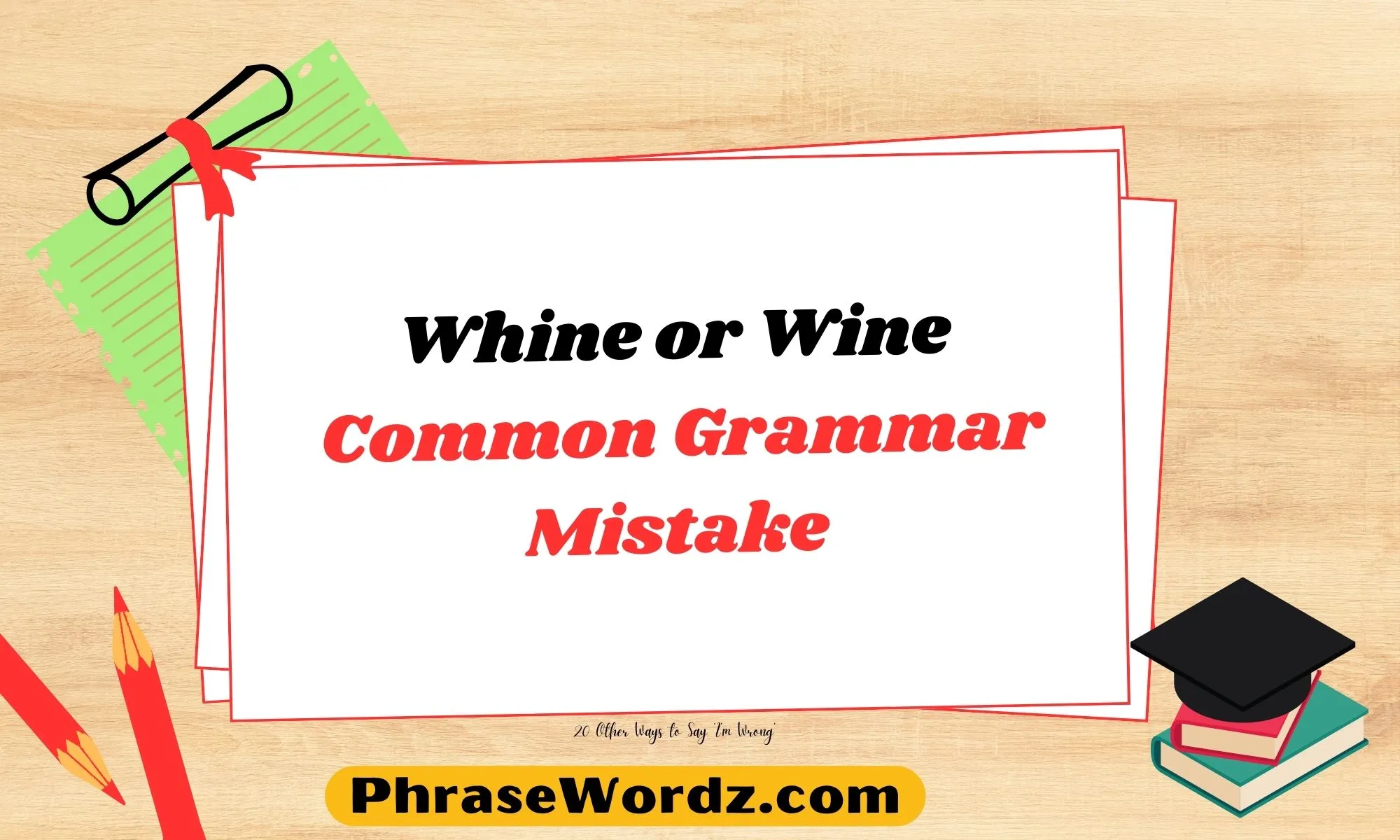English is full of words that sound alike but carry entirely different meanings, which often leads to confusion. The words “whine” and “wine” are classic examples.
This article explores the difference between “whine” and “wine,” provides practical examples, and offers tips to avoid this common grammar mistake. To ensure clarity, we’ll incorporate scenario examples, such as emails, conversations, and dialogues.
They are homophones, meaning they sound the same but differ in spelling and meaning. While the misuse of these words may not always cause major misunderstandings, it can create embarrassing mistakes in writing, especially in formal or professional settings.
Understanding “Whine”
The word “whine” is primarily a verb that means to complain or moan in a high-pitched or prolonged manner. It is often associated with negativity, complaints, or a childish tone. As a noun, it refers to the act of whining or the sound itself.
Examples of “Whine” in Sentences:
- Verb usage:
- “Stop whining about the workload and start finding solutions.”
- “The dog began to whine when it saw the leash, anticipating a walk.”
- Noun usage:
- “The toddler’s whine was enough to test everyone’s patience.”
Scenario Example: A Work Email
Subject: Feedback on the New Reporting System
Hi Team,
I understand that the new reporting system may feel like an added workload. However, I encourage everyone to share constructive feedback instead of whining about the challenges. This will help us improve the system and address your concerns effectively.
Best regards,
Rachel
Additions to Enhance Clarity:
- When correcting misuse, ask yourself: Is the context about complaining or emitting a high-pitched sound? If yes, “whine” is the correct choice.
- Synonyms for “whine” include complain, moan, gripe, and grumble.
Understanding “Wine”
The word “wine” is a noun and refers to an alcoholic beverage made from fermented grapes. It also symbolizes sophistication and is associated with celebrations, relaxation, and social gatherings.
Examples of “Wine” in Sentences:
- Literal meaning:
- “Red wine pairs wonderfully with a hearty steak dinner.”
- “The vineyard is known for its exquisite white wines.”
- Figurative usage:
- “Their friendship aged like fine wine, getting better with time.”
Scenario Example: A Dinner Invitation Email
Subject: Invitation to Wine and Dine Evening
Dear Sarah,
We are thrilled to invite you to a special wine and dine evening this Saturday at 7 PM. It will be a great opportunity to enjoy a selection of fine wines while catching up in a relaxed atmosphere.
Please let us know if you can make it. We look forward to seeing you!
Warm regards,
Thomas
Additions to Enhance Clarity:
- When correcting misuse, ask: Is the context about a drink or an enjoyable experience? If yes, “wine” is the correct term.
- Synonyms for “wine” include beverage, drink, merlot, chardonnay, and other specific types of wine.
Common Mistakes and How to Avoid Them
Mixing up “whine” and “wine” often happens due to their identical pronunciation. To minimize mistakes:
1. Context is Key
The easiest way to determine the correct word is by analyzing the context. Is the subject about complaining or beverages?
Example of Misuse:
- Incorrect: “She brought a bottle of whine to the party.”
- Correct: “She brought a bottle of wine to the party.”
2. Use Mnemonics
- Associate “whine” with whimpering or complaining (both start with “wh”).
- Remember “wine” by imagining a glass of the drink—it’s tangible and celebratory.
3. Practice Makes Perfect
Practice distinguishing the words in different contexts through reading and writing exercises.
Scenario Example: Chat Between Friends
Emily: Why are you always whining about Mondays? They’re not that bad.
Sophia: Says the person who looks forward to weekends with a glass of wine in hand!
How to Correct Others
Correcting grammar mistakes should always be done politely. Here’s an example:
Scenario Example: Professional Correction
Subject: Gentle Correction: Word Usage
Dear James,
Thank you for sharing your thoughts on the office party. I noticed a minor typo in your message. You wrote, “a bottle of whine,” but I believe you meant “a bottle of wine.” This is a common mistake, and I wanted to clarify for future reference.
Thank you for your understanding!
Best regards,
Elizabeth
Fun Facts About “Whine” and “Wine”
- The term “whine” originates from the Old English word “hwīnan,” meaning to make a whistling or shrill noise.
- “Wine” dates back to Latin “vinum,” which means grapevine or wine.
- In idiomatic expressions, “whine” often appears negatively (e.g., “Don’t whine about it”), while “wine” carries positive connotations (e.g., “Wine and dine”).
Summary of Differences Between “Whine” and “Wine”
| Aspect | Whine | Wine |
|---|---|---|
| Part of Speech | Verb, Noun | Noun |
| Definition | To complain; high-pitched sound | Alcoholic beverage |
| Pronunciation | /waɪn/ | /waɪn/ |
| Usage | Negative tone | Positive associations |
Final Scenario: A Memoir Excerpt
“As I sipped on a glass of wine by the fireplace, the distant whine of the wind reminded me of my childhood home. The contrast between the soothing drink and the unsettling sound brought back vivid memories.”
By mastering the distinctions between “whine” and “wine,” you can communicate more effectively, avoid embarrassing errors, and even help others refine their language skills. Practice is the key to turning potential pitfalls into polished prose.











